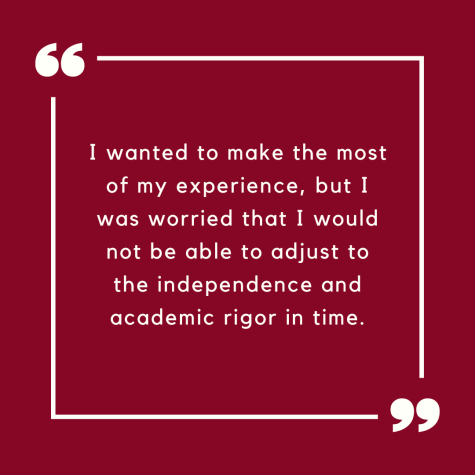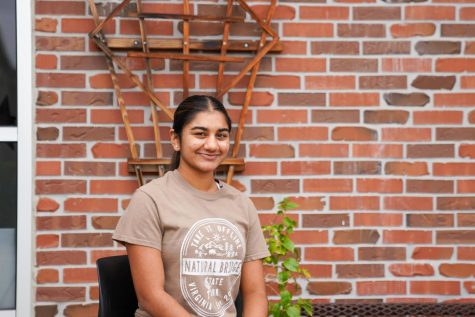Takes some getting used to
Learning to value my own pace of adjustment
On my first day at the program, although I was excited, I was also nervous about managing all the work.
October 22, 2022
The first thing I registered was the humid, sticky air that smacked me right in the face as soon as I stepped off the large aircraft that had brought me to Boston from San Francisco. Struggling to carry the two ginormous suitcases that contained all my belongings for the two months I’d be staying on the East Coast, I stumbled my way down the ramp and into the air-conditioned airport. As I waited for my family, I curiously looked around, fascinated by the unfamiliar, neon Dunkin’ Donuts signs and the new variety of people passing by. Although my unexplored surroundings initially sparked excitement, dread began to set in when I realized that, in a few hours, I’d be completely alone in this new environment.
I’m no stranger to adjustment. I’ve had two, major international moves between the U.S. and India and a variety of more local internal moves within those locations. I’ve become used to meeting new people, exploring new locations, and carving out my own niche in different atmospheres by finding places I could contribute to and gain comfort from. While these adjustments weren’t easy, I always took my time, asked for family support whenever needed, and let myself go through the emotions that accompanied my culture shock and stress. So, when I was accepted to an immersive summer program at Harvard University, one in which I’d live and study on Harvard’s campus for seven weeks, I wasn’t worried about adjusting to the new environment. I thought it would be easy, considering how many times I’d done it before. Instead, I was just ecstatic at being accepted into the program.

As the start of the program drew closer, my anticipation grew, and upon first stepping off the plane, I felt exhilarated. However, I soon began to realize my old adjustment tactics might not be as applicable to this scenario. In previous instances, I had the support of my family and the gift of time. For this program, though, I’d have to adjust to a new lifestyle while being completely independent in the mere seven weeks I’d be at the program. I would have to learn to do everything on my own, from getting my own food to finding my own rides to my own external activities. The stakes were high as well: I was taking advanced classes and had been accepted into the program’s audition choir, and I needed to make sure I fulfilled my commitment to those activities. I wanted to make the most of my experience, but I was worried that I would not be able to adjust to the independence and academic rigor in time.
It didn’t help that my roommates and friends seemed to adjust far quicker than I was. Within the first three days, they seemed to have found a perfect balance between classes, health, sleep and personal lives. I, on the other hand, found myself floundering at the end of the first week — the homework and papers had hit me like a truck. Between managing personal responsibilities, spending countless hours in the library finishing my work and attending choir practices, I felt completely depleted by the end of each day.
A part of me felt humiliated for not being able to keep up with the rapid pace of accommodation that my friends had achieved. I was confused as to why this version of change was so difficult: I’d done it before, so why couldn’t I do it here? I was worried that my seemingly-slow ability to adjust meant that there was something wrong with the way I worked. Not only was I worried about what this meant for my ability to truly experience all aspects of the program, but also for my future expeditions. I was going to college soon enough: what if I failed to adjust there? That was a long-term change in which I’d have to be independent, but what if this experience foreshadowed that I’d struggle and drown there as well?
Upon finishing the first week of the program, I was exhausted. I had never been more grateful for the weekend, and spent it recovering by exploring Boston with my friends. When Monday of the second week rolled around, I was nervous about having to repeat the same, exhausting routine once more. However, I went into this second round without a comparison factor in mind. I stopped comparing every activity I did with how my friends executed it and began to reassure myself that even though I seemed to be taking a bit longer, it didn’t mean there was an issue with my routine or my habits.

With this new mindset, I found the second week a bit easier. I was able to get a little more efficient with reading the 20 or 30 papers I’d been assigned for my psychology class and found time to eat my meals in the dining hall instead of packing them up to eat while I studied. I balanced my housekeeping duties for my dorm room with choir practices by spending at least 30 minutes each night after rehearsal completing them so that they didn’t pile up later. By the end of the second week, I wasn’t nearly as exhausted as I was in the first week, and by the time the end of the third week rolled around, I had hit my stride and found myself well-adjusted to the routine and life that I was living at the program.
Seeing my friends’ quick accommodation to change made me feel like I was behind when in reality, I realized that there isn’t a right or wrong timeline for getting used to change. Everyone handles change differently, and if getting used to a new routine takes longer, that doesn’t mean anything negative about a person’s style of work or their method of accommodating a new environment. Whether fast or slow, my pace of adjustment is just right for me.


















